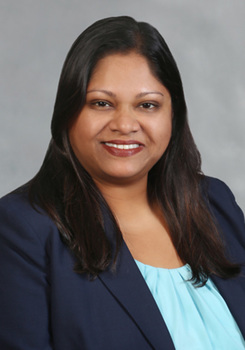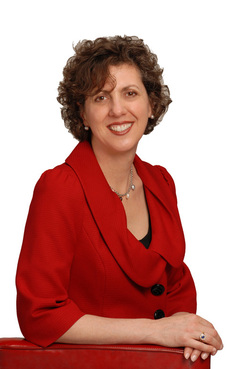 Supti Bhattacharya
Supti Bhattacharya
A partner a Hill Wallack as of 2016, Supti Bhattacharya is one of the firm’s youngest partners and chairs the divorce and family law department in the Princeton office. She helped form the firm’s Diversity & Inclusion Committee, which she co-chairs, and is heavily involved in its women’s initiative. Bhattacharya also is active with the New Jersey State Bar Association, including as co-chair of the organization’s Diversity Committee, and as a CLE lecturer.
Why is diversity particularly important in the legal profession? Lawyers are service-based professionals. Our sole product is communication in its various forms. We talk and write for a living. How we communicate makes the services we each provide unique. Diversity in the way we communicate helps expand the reach of the legal profession to individuals who otherwise may have been isolated due to cultural, ethnic, religious, language or other barriers. People also often seek services from those with similar backgrounds to match their own world experience. Diverse backgrounds also bring different life experiences and thought processes to the table, which expands how a team can tackle client issues. Be it individual or corporate legal services, diversity helps clients to achieve a better result.
Are law firms and other organizations employing lawyers doing enough to foster diversity? What could they be doing better? While law firms and organizations employing lawyers recognize the need to foster diversity, many simply do not know how to diversify because they lack experience in this area. Unconscious bias can undermine diversity and inclusion efforts as well. Education about unconscious bias and active efforts to address and tackle it in the workplace is important. In addition, appointing diverse attorneys to recruitment and hiring committees, to lead departments, to firm management, and to other firm and company leadership roles shows visibly a firm or company’s commitment to diversity and inclusion. Actions speak louder than words.
What unique challenges do diverse attorneys face—on their teams, in the courtroom, in the conference room, and beyond? Diverse attorneys are often the sole minority within a law firm. We encounter assumptions and preconceived notions about who we are based on our physical appearance, which isolates us and highlights our differences, rather than naturally integrating us as professional colleagues. To be included, we often must make extra efforts to extend ourselves socially in order to break past unconscious biases that create barriers. Non-diverse attorneys do not have this experience of being “the other,” and by default are included on a daily basis.
Name a mentor, or someone you admire, and why. My mother is one of my greatest inspirations and my first mentor. She raised me to value education, to be independent, and to treat people with honesty and respect above all else. As an immigrant from a conservative, non-Judeo Christian culture, my mother experienced and overcame racism and sexism while living in both Europe and the United States after she left India in the 1960s. I live and work as I do today because of diverse immigrants like my mother who came before me, and I appreciate their efforts every day.
What is the best advice you ever got? Or, what is your best advice for someone looking to make an impact in the legal profession? Find what makes you unique and use that trait, skill, knowledge, or ability to create a career that makes you different than your colleagues. Therein lies your value and indispensability to your clients and law firm.
Rachelle Bin
 Rachelle Bin
Rachelle Bin
As assistant general counsel at Fox Rothschild in the firm’s Princeton office, Rachelle Bin’s work, according to one colleague, is “all-but-invisible to the outside world, but critical to the firm’s overall success as she tackles a steady stream of complex questions that arise in almost every area of the law.” The work includes frequent travel to the firm’s numerous offices for attorney training. Bin, a daughter of Cuban immigrants whose first language was Spanish, is a former in-house lawyer for Univision Communications and currently a Spanish language volunteer with Latin American Legal Defense and Education Fund.
Why is diversity particularly important in the legal profession? We are not a homogeneous society anymore. Society is diverse. Diversity is important in the legal profession because we should be a reflection of the clients we serve and of our communities. There is a very real benefit that flows from this. In a law firm, you want a variety of different voices; otherwise, you will find yourself in an echo chamber where you all think alike. Beyond law firms, diversity is essential throughout the legal profession—from law schools to the courts to Congress—because our legal institutions depend on the public’s trust for their legitimacy. If some segments of society are shut out of the profession, that trust is eroded and can be lost.
Are law firms and other organizations employing lawyers doing enough to foster diversity? What could they be doing better? I cannot speak about all law firms, but I can speak about Fox Rothschild. Fox is very committed to diversity—not just racial and ethnic, but diversity of all types. We care about diversity because it is the right thing to do and we benefit as a firm. There is a value to working with people from diverse backgrounds as they offer a healthy variety of perspectives and opinions. Our clients also care deeply about diversity.
What unique challenges do diverse attorneys face—on their teams, in the courtroom, in the conference room, and beyond? Many diverse attorneys grew up without professional role models in their families or even in their neighborhoods. Imagine spending the first two decades of life unable to picture yourself in the role of a lawyer. That can be a real obstacle even for a gifted student who works hard. Those kids need to find role models on their own. That is one reason mentoring programs in law firms are so important.
Name a mentor, or someone you admire, and why. The two people I continue to admire are my parents, Manuel and Marta Bin. They were Cuban refugees who fled communism and came to the United States in 1960 to give their family a better life. They taught me that with an education and hard work—which were the paramount values in our home—you can get ahead in this country. I was always taught that this is the best country in the world, a country that accepts refugees and immigrants like no other country does. That is how my brothers and I were raised and that is how my husband, who is an immigrant, and I are raising our three children.
What is the best advice you ever got? Or, what is your best advice for someone looking to make an impact in the legal profession? Both of my daughters are in college now, so we talk at times about career choices and whether law school is a path they might consider. I try to show them how much you can do with a law degree—that you can truly make a difference in society by using your education and your access to legal institutions to help those who do not have access. Since my daughters are bilingual, I tell them there is an even greater need for their skills to represent the Spanish-speaking community. Whatever path they choose, I hope they see the law as a vehicle for social good.


